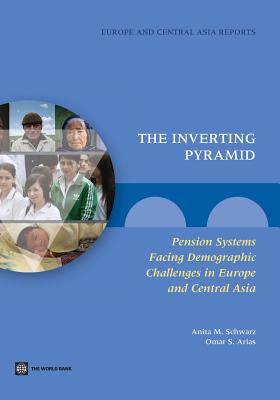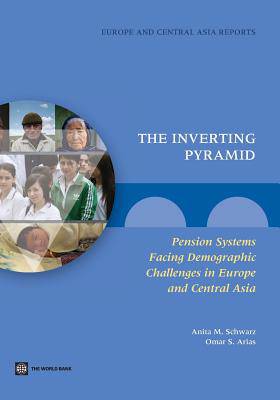
- Afhalen na 1 uur in een winkel met voorraad
- Gratis thuislevering in België vanaf € 30
- Ruim aanbod met 7 miljoen producten
- Afhalen na 1 uur in een winkel met voorraad
- Gratis thuislevering in België vanaf € 30
- Ruim aanbod met 7 miljoen producten
Zoeken
The Inverting Pyramid
Pension Systems Facing Demographic Challenges in Europe and Central Asia
Anita M Schwarz, Omar S Arias
€ 36,45
+ 72 punten
Omschrijving
"Europe's pension systems -among the most celebrated features of its social welfare model- face tremendous challenges. With only 11 percent of the world's population, Europe spends about 60 percent of global outlays on social protection, largely in pensions. In many countries, pension rules have encouraged people to retire sooner, while enjoying longer lives. Payroll taxes on a continuously expanding contributory base have financed these benefits. This model of pension provision is now being severely tested as pension systems reach maturity, while the population is aging and the labor force is starting to shrink. Measures to enable a continued tradition of providing old age security will include - raising retirement ages such that pensions are provided in the last 15 years of life, when work capacity traditionally diminishes - encouraging immigration to help fill the declining work force - rationalizing pension spending, putting priority on preventing old age poverty, and - encouraging savings to help provide the more comfortable retirement that individuals have come to expect. Some measures may be more appropriate in particular countries than others, yet undertaking all of them will likely require less drastic changes in any one of them. The specific choices will need to be discussed and agreed among each country's own population, and be accompanied by enabling changes in pension policy, tax policy, financial markets policy, and labor policy. The fundamental issue is that, with these changes, the important achievements of European social policy can withstand the demographic onslaught and continue to provide old age security for generations to come."
Specificaties
Betrokkenen
- Auteur(s):
- Uitgeverij:
Inhoud
- Aantal bladzijden:
- 300
- Taal:
- Engels
- Reeks:
Eigenschappen
- Productcode (EAN):
- 9780821399088
- Verschijningsdatum:
- 12/02/2014
- Uitvoering:
- Paperback
- Formaat:
- Trade paperback (VS)
- Afmetingen:
- 175 mm x 251 mm
- Gewicht:
- 612 g

Alleen bij Standaard Boekhandel
+ 72 punten op je klantenkaart van Standaard Boekhandel
Beoordelingen
We publiceren alleen reviews die voldoen aan de voorwaarden voor reviews. Bekijk onze voorwaarden voor reviews.











